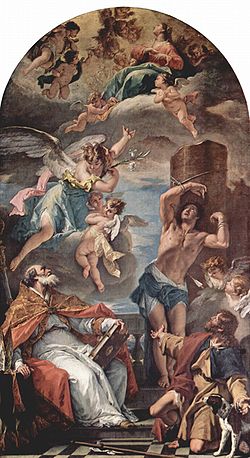Eusebius of Vercelli
| Saint Eusebius of Vercelli | |
|---|---|

The Virgin Mary in Glory with Archangel Gabriel, and Saints Eusebius of Vercelli (seated), Saint Sebastian, and Saint Roch, Sebastiano Ricci.
|
|
| Bishop and Confessor | |
| Born | c. March 2, 283 Sardinia |
| Died | August 1, 371 (aged 88) Vercelli, Piemonte |
| Venerated in | Roman Catholic Church |
| Feast | August 2; December 15 (General Roman Calendar 1602-1728); December 16 (General Roman Calendar 1729-1969) |
| Patronage | Vercelli |
Eusebius of Vercelli (c. March 2, 283 – August 1, 371) was a bishop and saint in Italy. Along with Athanasius, he affirmed the divinity of Jesus against Arianism.
Eusebius was born in Sardinia, in 283. After his father's martyrdom, he was taken to Rome by his mother. Having received the Ministry of Lectorate, he was a lector in Rome before he became the first bishop in Vercelli (in northern Italy), probably sometime in the early- to mid-340s. He was the first bishop to live in common with the clergy, devoting his best energies to form them in piety and zeal. According to a letter of Ambrose to the congregation in Vercelli two decades after Eusebius' death, the local leaders recognized his piety and thus elected him rather than local candidates (Epistola lxiii, Ad Vercellenses). At some point he led his clergy to form a monastic community modelled on that of the Eastern cenobites (Ambrose, Ep. lxxxi and Serm. lxxxix). For this reason the Canons Regular of St. Augustine honor him along with Augustine as their founder (Proprium Canon. Reg., 16 December).
In 354, Pope Liberius asked Eusebius to join Bishop Lucifer of Cagliari in carrying a request to the Emperor Constantius II at Milan, pleading for the emperor to convoke a council to end the dissentions over the status of Athanasius of Alexandria and the matter of Arianism. The synod was held in Milan in 355. Eusebius attended part of the council, but refused to condemn Athanasius and so was exiled, first to Scythopolis in Syria, under the watchful eye of the Arian bishop Patrophilus, whom Eusebius calls his jailer, then to Cappadocia, and lastly to the Thebaid, in Upper Egypt. Several letters surrounding the council written to or by Eusebius still survive, as do two letters written by him during his exile.
...
Wikipedia
